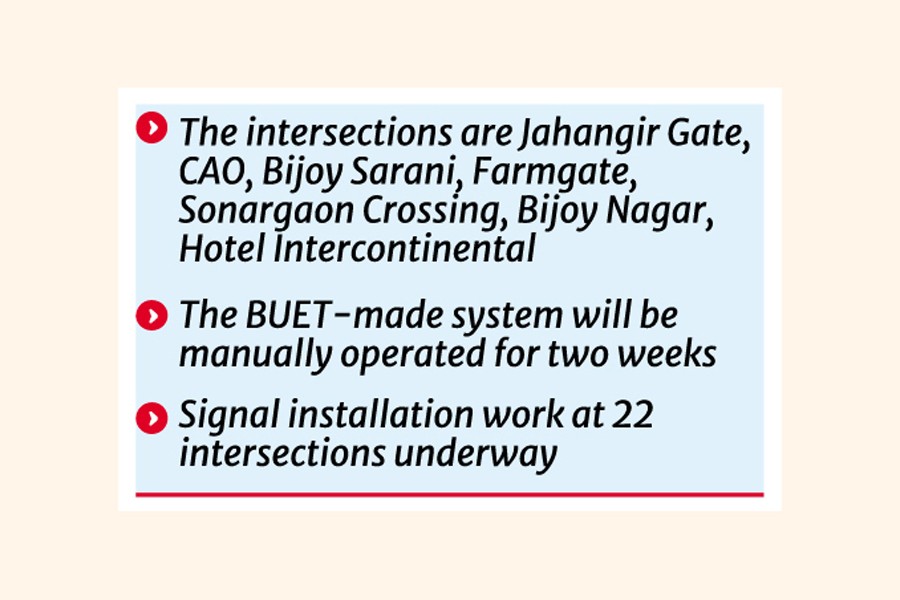
Published :
Updated :

The Dhaka city is set to get a local-model signalling system at its seven busy intersections from Jahangir Gate to Hotel Intercontinental, which will be manually operated on an experimental basis for two weeks, beginning on Saturday (tomorrow).
The intersections are Jahangir Gate, Chief Advisor's Office (CAO), Bijoy Sarani, Farmgate, Sonargaon Crossing, Bijoy Nagar, and Hotel Intercontinental.
Officials said the piloting move is the first part of the government's initiative to ensure proper operation of traffic signal at 22 intersections from Airport to Shikkha Bhaban near the High Court. The system, prepared by Bangladesh University of Engineering and Technology (BUET), may be gradually installed at all the intersections after upgrading and improving, taking into consideration day-to-day experiences.
Dhaka Transport Coordination Authority (DTCA) held a coordination meeting on Thursday with special assistant to the chief advisor on rail and road transports, Dr Sheikh Moinuddin, in the chair. He will also visit the intersections today (Friday) to see operation of the system.
The meeting was informed that signal installation work at 22 intersections are underway with the financial support of two city corporations and technical support of BUET. DTCA is coordinating the initiative.
The officials said the foreign-model signalling systems, installed earlier in the city with the financial and technical supports of different development partners, were unsuccessful. The BUET-made system might be a better solution for the over-saturated traffic in the city due to use of available technology in the signal system.
According to the sources, the signalling system will be controlled both automatically and manually by counting vehicles through CCTV from all sides of the roads on the entire straight alignment. All the intersections will have separate control rooms, from where traffic police members will change the signals after coordinating with their colleagues on other intersections.
"Operating automated signalling system would be difficult due to heavy traffic during the day time. But it will be operated at night by fixing time," said an official concerned.
Meanwhile, BUET has trained a total of 125 traffic police members to operate the signals on shift basis.
The BUET signalling system has been prepared by its Civil Engineering Department under the leadership of Professor Moazzem Hossain. It will be upgraded with the support of Electrical and Electronics Engineering and Mechanical Engineering departments.
Dhaka has been identified as a unique capital city, as traffic police members use their hands to control traffic at all the intersections, including main roads and lanes.
smunima@yahoo.com


 For all latest news, follow The Financial Express Google News channel.
For all latest news, follow The Financial Express Google News channel.